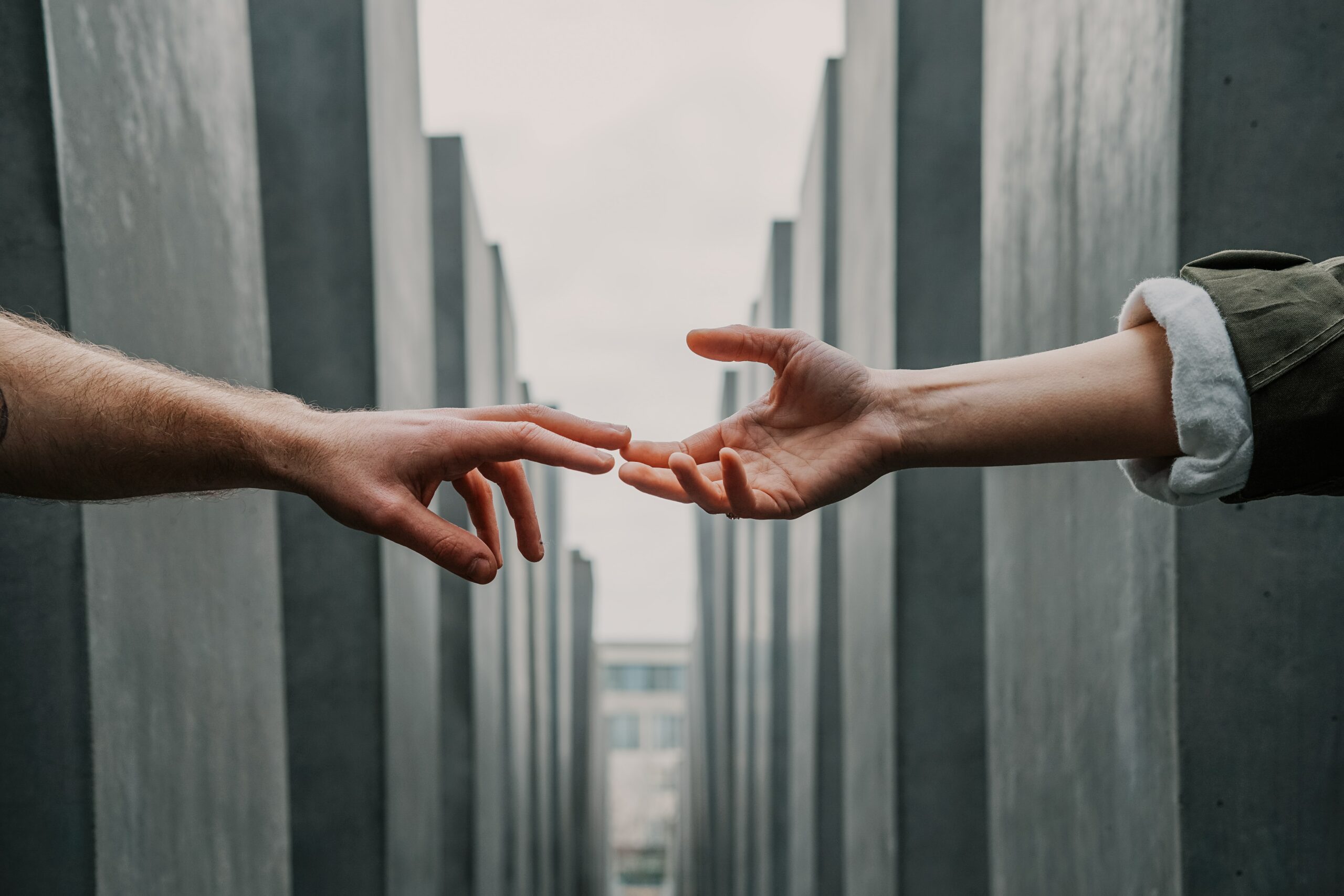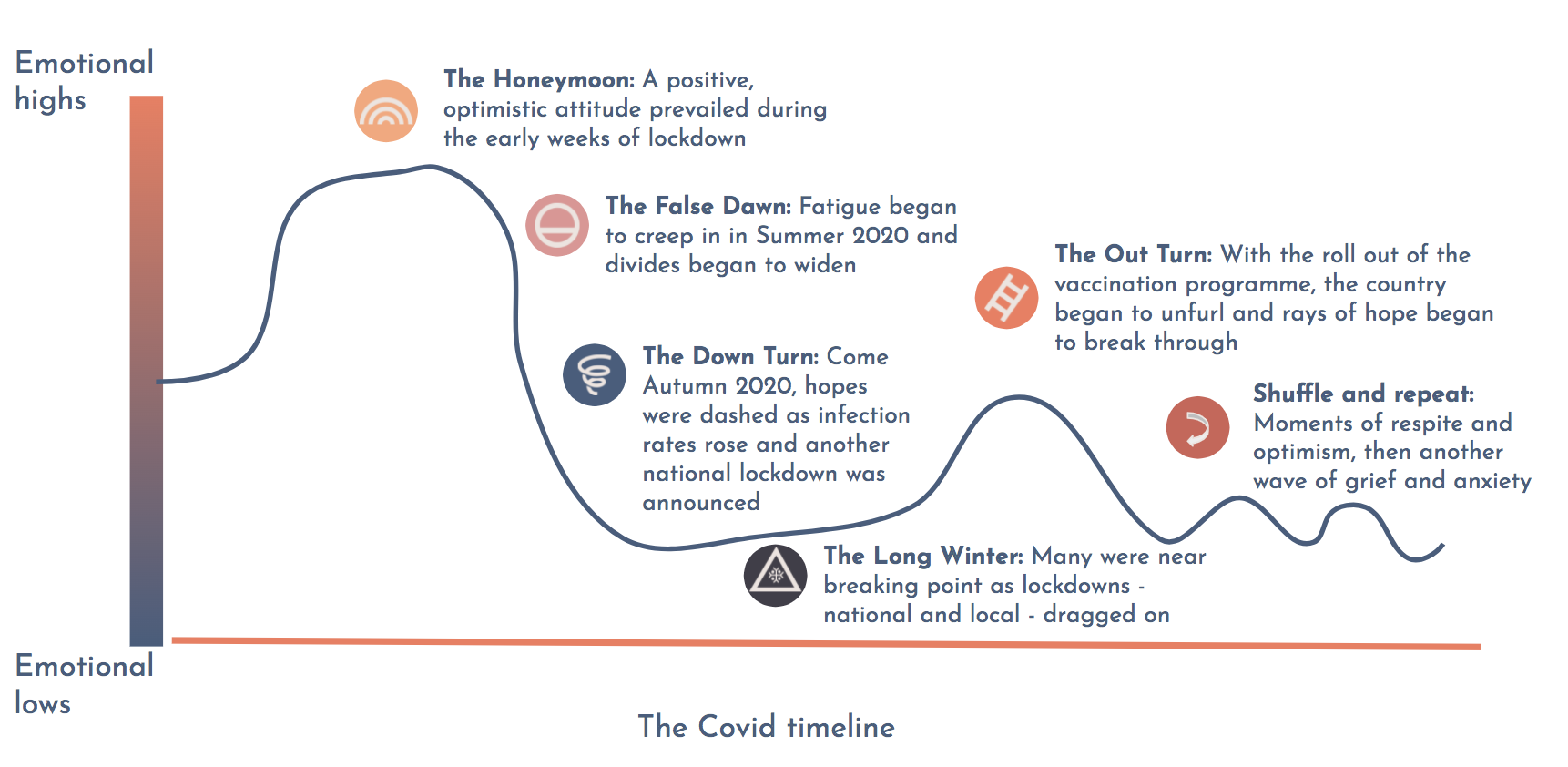Most of our Observatory Sightings have been about immediate observations and insights – the things that people are saying and doing week by week. In this first Sighting of the New Year, we are stepping back and reflecting on the emotional drivers – the feelings as well as the practical experiences that will shape the future.

“Can anyone come out of all this and not be changed by it?” asked one of our Observers last autumn. Whether you are one of the 33% of the workforce working all hours as a key worker, one of the 9m giving more than 3 hours a week to the care of others or one of the countless others coping with homeschooling, bubble support or essential shielding, it has been, and continues to be, a time of great change, challenge and pain.
My neighbour was cooking me hot dinners as she knew I was on my own – she also did this for my mum at the start of lockdown. She is cooking me a Christmas dinner on 21st December, which I am really excited about. These little things made everything easier to cope with and made me feel less alone. Lockdown was very hard for me with the passing of my mum and brother – this will be hard to remember, especially as I could barely see them before they passed away.
Over the last ten months, we have been gathering and sharing immediate observations and insights – the things that people are saying and doing week by week. In the second half of last year, we began to dig a little deeper, conducting interviews and encouraging groups and individuals to look back and share their reflections in our “Spirit of Lockdown” Story Book. We are interested not only in what people have been doing but also in how they feel about this extraordinary time and about the future.
Successful renewal must reflect shifting attitudes and new mindsets. That’s why we are devoting the next couple of Sightings to the “emotional drivers” – the feelings and the reflections from 2020, the hopes and the fears for 2021. As in all our Sightings, the observations are individual and personal but the ones we have chosen seem to us to represent wider trends.
Keeping apart and coming together
In the year when we learnt about social distancing, we also learnt more about, and became more interdependent with, the people who live close to us. Corner shops, postal workers, street cleaners became more visible and vital. We noticed, often for the first time, neighbours we looked out for or neighbours who looked out for us. And the disruption that affected us all, in different ways, created a new context for talking and connection.
“There are some who find it difficult to ask and it’s been made easier – maybe for a lot of people it’s got easier to say, please could you?”
Everybody who wasn’t a key worker suddenly found themselves at home, some shielding alone, others moving around but within a small neighbourhood. There was a sense that, unusually in modern life, we didn’t choose the people we were with by age, or interest or demographic. “Our world got smaller” said one and we were “thrown together”. For many this is likely to leave an enduring legacy.
The first lady I shopped for, who lives five minutes walk from me, she’s not shielding anymore – when she’d finished, she said ‘oh, I’d like to invite you and your husband to meet me and my partner, we can sit in the garden’ – and we’ve sort of carried on, subject to the restrictions obviously – so they’ve come over here and we’ve had dinner in the garden. So it’s been really nice – and she’s not someone who I’d EVER have met otherwise. We get on really well, we have a bit of a laugh. She’s from British Guyana, and she moved over here when she was a teenager and worked for the NHS all her life. But she’s a bit of a party animal – even though she’s 70–she’s got some great stories. And I don’t know–we just clicked.
I met people–like the guy with cancer, who’s Jamaican. I was like, ‘When this is all over we’ll go for a Wray and Nephews.’ I won’t go to his door, but if I bumped into him I know I could start up a friendship with him and hopefully help him in the future.
Eye openers and levellers
Many of our Observers talk about new connections that became an introduction into a world that they had never seen before.
I think it opened my eyes to – I don’t want to say suffering – people’s circumstances. It opened my eyes to the loneliness that happens in the country.
We couldn’t see what each other looked like – we didn’t know how old we were. We didn’t know what social background we were from… . And so in that sense it was a great leveller, I thought. We didn’t have to go through, you know ‘where do you live? How big is your house? Do you live in a house or block? How educated do you sound? Whatsapp seemed much more inclusive. People trusted each other a lot faster than they would in a conventional group.
I was a bit shocked to find out when one of mine said, ‘oh, can you only spend £10 this week because that’s all I’ve got. And I was a bit like, okay, this is someone who lives near me – he’s in my neighbourhood, and this is someone who’s only got £10 to feed himself. In that way it’s been a real eye opener, to realise that there are people in your community – real people, you know – who are struggling.
Social connection and social justice
For some these “eye openers” were uncomfortable and difficult. For others, they started important conversations that won’t stop when the pandemic is over. These were conversations not only about social connection but also about social justice.
It became more challenging as time went on […] because a good 40% of requests were from people who were in that – you know – group that didn’t have money […] There was a slight awkwardness to it which had taken a turn from the original feel of the group … Initially there was a feeling of ‘we’re all in this together’, and then I think it became a bit challenging for some people – because it’s then talking about poverty, and the welfare system, and disadvantage, and whether Lambeth [council] is good or bad at supporting such people.
One of the issues with the Covid group as it went on […] is the kind of rubbing up against the hard reality of people’s lives. At the start it was a little bit ‘oh this is almost jolly and interesting and ooh we can help our neighbours,’ and then within a few weeks it became a slightly awkward realisation that there are people in our midst who have practically no money at all – in the same street as others are ordering Ocado and buying bags of organic pasta. And I think that’s uncomfortable for people.
Beyond the pandemic
Feelings are mixed about the extent to which these new relationships and fresh insights will change the ways in which we live together and run our lives in the future. Many spoke about social divisions pre Covid. Most feel that this has changed during the pandemic, maybe for good or maybe only temporarily.
I think that’s become less clear as time goes on. I think because we’ve seen in recent years Brexit and all these political things that have divided so many people. […] Things feel very fraught at the moment. I think there’s surprising pockets of community resilience and shared ownership… I don’t think the media conveys an accurate representation – I think it likes to pit people against each other. I think there is more of a sense of citizenship and community than we realise. I hope it is – I’m kind of an optimist.
The element of community cohesion and belongingness has changed…. The way society has become, there is a lot of hatred and division. This virus has been a wake up call for a lot of people that we need to reach out and help each other. People’s opinions, morale, sense of belonging has changed …. Covid has been a shock to people – what do we consider humanity to be? It’s been a wake-up call
I think there’s a mixture of both sides. I think Covid and the pandemic has really highlighted the selfish nature of a lot of people. I know it’s really exaggerated in the media anyway, but hoarding and things – it’s highlighted how brilliant and how helpful and how caring some people can be, and it’s also really highlighted how selfish and self-centred other people can be.
The little silver threads
Whilst it might be difficult to predict the long term impact on relationships across society, many people told personal stories about individual experiences. Some were about new relationships, others about old ones rekindled. After a year that was clouded by loss and struggle and separation it is too early for optimism, but maybe not to spot the little silver threads.
I learnt that even though it’s hard to trust people right away, it is possible to make a new friend in the neighbourhood – this was very helpful. My existing friends were elderly too, so we all had to shield from the virus. It was good to make a new younger friend and this would not have happened without the virus.
How do you feel?
What are your reflections on 2020 and what are your hopes and fears for the future? Please join the conversation. You may find our Spirit of Lockdown Story Book helpful or just email me directly david@relationshipsproject.org.
Thanks to this week’s contributors
The Observatory is a voluntary collaboration led by the Relationships Project. We are dependent on the eyes and ears of our observers and partner organisations and we need more.
This weeks’ contributions are more personal than usual so we have changed some of the names. You know who you are! We are grateful to Rosalyn, Kate, Nick, Khan, Alan, Anna, Brianne, Dhanmeet, Simon and Elizabeth.
Read more

How to care for Warm Welcome Volunteers: A guided reflection
In brief In this blog, originally written for the Warm Welcome Network, we review what we learnt about community responses to the pandemic to ask how we can sustain and maintain the momentum in community-based responses to the cost of living crisis. In the early...

Where are we now?
In brief In this milestone blog David Robinson takes the temperature as we approach the second anniversary of Covid 19. The UK is stuck in a pattern of “shuffle and repeat” with fears for the future, but also the possibility of hope.The past two years have caused...
